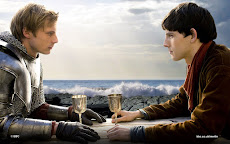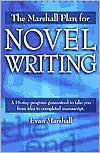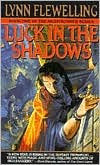Wednesday, March 14, 2007
Back to the Drawing Board
I've been on Cloud 9 since completing the first draft of THE ISLE, but it's time to move on. I've worked every night without missing a beat, revisiting my planning notes for THE REFLECTING STONE, preparing myself for the next draft of that novel, which is my first completed novel, still in first draft form.
On Sunday, after I finished THE ISLE, I spent several very productive hours reworking the mythology for both stories. I am now set on linking them together as part of a larger series.
When I worked on THE REFLECTING STONE last year, the mythology was always a struggle. Progress seemed slow and challenging, with a constant need to simplify. By the time I had finished the first draft, the mythology was in pretty good shape. With THE ISLE now complete and serving as a sequel, there are new ideas for me to incorporate into that existing mythology. Specifically, I needed to expand the range and focus of events.
In my work Sunday night, the new and the old meshed well together and it was not only NOT difficult, it was fairly easy going with terrific results -- the first time that has EVER occurred in the past year and half when working with this mythology!
Monday night I spent another several hardworking and highly productive hours working through the internal plot for THE REFLECTING STONE. I used Alicia Rasley's excellent article on this, working through her nine questions to help put things in perspective. She approaches the topic through the notion of the heroic flaw, but your MC does not have to be a Greek hero for you to find the article helpful. In fact, unless you're writing a tragedy, you want your MC to learn a lesson and overcome the difficulties, which is what those nine questions are geared toward. You can find her article on the internal plot here, and an index to her other helpful articles here.
Following a guideline is a technique I've discovered in the past year. It helps keep me focused. I normally don't use someone else's template to guide my own thoughts, but in this case Ms. Rasley knows her stuff and her articles keep me focused and save me a lot of time when I'm wrestling with difficult concepts or ideas that become convoluted when applying them to a lengthy and involved story.
Internal and external plots are related. My understanding of them is that there is a main external plot, something the main character (MC) is trying to accomplish: a goal, in other words, with obstacles that stand in the way. Separate from this, there are things going on in the MC's life that define how he/she sees the world, and responds to it. These emotional issues, beliefs and patterns of thinking and behaving affect how the MC solves problems, how he/she reacts in a variety of situations. Ultimately, they define some aspect of his/her personality, and will impact how he/she responds to the obstacles along the way toward achieving the external goal. The internal plot is essentially a progression for the MC from one point to another on some emotional and/or cognitive level. The internal plot is a journey of internal change in attitudes, beliefs, values, etc., that will ultimately affect external behavior and affect whether he/she can achieve the external goal over time. Ultimately, the MC has to solve some internal conflict, has to grow as a person in some way, in order to be able to "win" in the final climactic event.
In real life, this is not always the case. Sometimes we set an external goal, strive for it and achieve it, and we do this without any significant change in ourselves or our lives other than we worked for something and got it, whether it be through actual work (earning money, putting it aside, buying something), or in some other figurative sense (wooing someone, earning their affection).
However, sometimes our lives do play out exactly like this. Sometimes we are our own worst enemy. Sometimes we have something in our attitudes or beliefs or patterns of behavior that cause us to stand in our own way. We cannot achieve a certain goal sometimes until we resolve some inner conflict, find a better way of coping or acting or managing ourselves or our lives. Only after resolving our own issues are we finally able to achieve some other goal. This could mean learning to manage a budget in order to buy that new house or car, or overcoming drug addiction (or whatever) so that special someone will consider a relationship with you.
For purposes of our fiction, it is convenient to think of the MC as having a particular strength that will help him/her achieve the external goal. That strength comes with a price, a weakness, on the flipside. For example, being daring might help the MC rise to the occasion when others shy away from it, but this strength is also a weakness if the MC takes people up on foolish dares and gets injured. There is what Ms. Rasley calls a "default behavior", a way of acting when pressed on the issue that is purely reactional. If someone offers a challenge, for example, the MC takes them up on it. I think of the BACK TO THE FUTURE movies where the MC could not turn down a dare if someone called him "chicken" (or whatever the case was). When challenged, the MC will typically engage in the default behavior, which in turn can lead to negative, even potentially dangerous consequences which hurt the MC's chances of achieving the larger external goal.
It is important to show this trait as both a strength and a weakness, and to establish the default behavior as a reaction under certain circumstances. It is also important to show that while the MC may respond with this default behavior more or less automatically, in fact he/she does not have to. There is a choice. As the MC learns that this default behavior is not a good one, he/she has the opportunity to make a choice and do better (= growth).
Circumstances must develop that put the default behavior to the test, and finally teach the MC the lesson he/she needs to learn. At some point, the coping mechanism is simply not good enough, and a better response is needed. The MC will not necessarily do the right thing at that time, but at least the idea will get through. Ms. Rasley points out that even a moment's hesitation before engaging in the default behavior is enough to show that the concept has gotten through to the MC, that he/she is now aware of the fact that this behavior is not helping, and maybe something better is out there, a better way to respond. Eventually there will be other opportunities for the MC to try out the new pattern, and by the end of the story the MC will be able to combine the main strength from the beginning of the story, which is still there, still a strength, with the insight gained along the way, the lesson learned, thereby overcoming the weakness, capitalizing on the strength, and overcoming the final conflict to win the prize.
Of course, sometimes winning the prize is realizing that the prize was not worth winning in first place. All sorts of twists and turns are possible.
After all this progress over two nights, I spent last night, Tuesday, going back over all this work and for the first time officially putting together ideas for the remainder of the series. The series is based on ideas I've had for years, and had intended to put together in one volume, a stand-alone novel. However, I am now drawing on that concept, applying these stories to it, and seeking to develop a multi-part series that expands on the original idea and makes use of some pretty cool and interesting stories, in my opinion (THE REFLECTING STONE and THE ISLE -- I like them both a lot).
I'll comment more on that work tomorrow, since the work will continue tonight, and I'll be sure to include comments on the virtues of EXTRAPOLATION.
Best wishes, whether planning or writing, or even just dreaming,
Adrian
Subscribe to:
Post Comments (Atom)








No comments:
Post a Comment